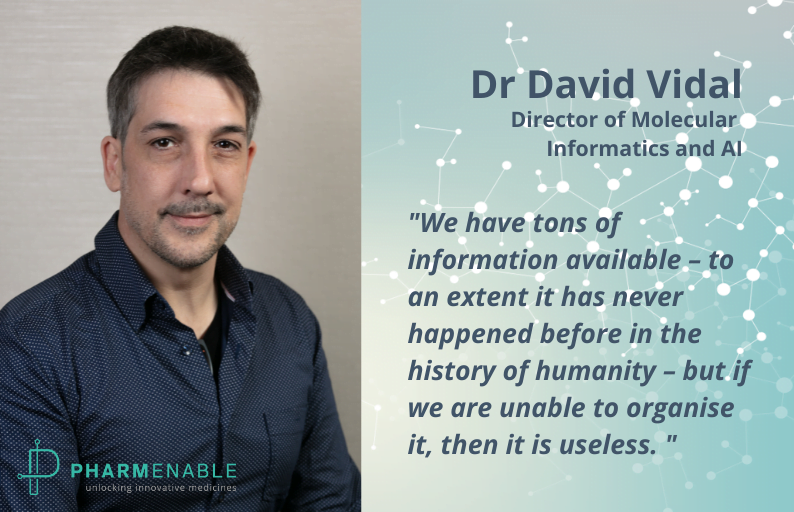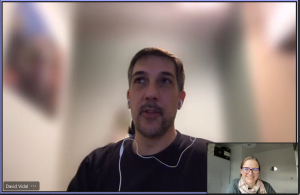David, you and your team at PharmEnable recently developed a Knowledge Management System (KMS) with o2h Technology and our readers would like to learn from your experience. Before we start, could you please give a brief intro to PharmEnable – what is your business?
We are a drug discovery company based in Cambridge (UK). We are developing complex specific small molecules, using a combination of medicinal chemistry and a proprietary AI and computational approaches. Our mission is to discover new treatments for conditions of high clinical need.
You must be using a lot of data for your analysis?
Yes, our key selling point is our proprietary and unique accessible chemical space: chemUNIVERSE. The chemistry knowledge embedded in chemUNIVERSE can be used to create billions or even trillions of complex and synthesisable molecules. This is the source of all the chemistry we are using in our projects, it is constantly growing and it is unique to us. We use it to unlock targets that have remained really challenging to drug.

Partnering with o2h Technology you developed a new knowledge management system (KMS) for PharmEnable. What was the problem that you wanted to solve with this new platform?
We use a lot of scientific data and information from different sources, and there were two problems we wanted to solve: interconnectivity and accessibility. We are not interested in isolated islands of information. What we are interested in is to combine all the data together to extract intelligence for our projects. That is what we mean by interconnectivity. The other part is accessibility, in terms of making the relevant knowledge available to everyone. We wanted a system where everyone in the company can access the appropriate layers of information. For example, for a given target it enables us to quickly access the information that is already out there on therapeutic areas, patents and material about this target.
Without giving away any confidential information, can you give our readers an idea of the type of data you wanted to organise?
We organise a lot of different types of data, including: scientific publications, patents, bioactivity data, protein targets, drug related info, therapeutic areas, biological pathways and chemical information.
What would you do today without KMS?
Without this knowledge management system, it would take our team a lot more time to find and access the right information. Although the data may be out there in the public domain, this existence does not imply accessibility. Often data is split in different pieces here and there, they are like disconnected dots and if you do not connect them, it is not possible to extract the knowledge from them.
Without this knowledge management system, it would take our team a lot more time to find and access the right information.
How did you come up with the idea of a web platform solution?
In my daily work I started to collect data from different sources. However, using scripts to automatically process, explore and extract intelligence from this data is not a solution that works for everyone. So I started wondering, “How can we make data available throughout the company?” I realised we needed to put all the data together and cut the time it takes to access it. Luckily, we got in touch with o2h Technology through our investor contacts at o2h Ventures. And after our first discussion, it became clear that it was possible to go beyond what we had initially thought, and the idea of the Knowledge Management System came to life.
What is your long term vision for the knowledge management platform?
We have a number of ideas for features to add in the future. For example, in future versions we would like to be able to ask a specific question and make the application return everything that fits within that. Not making simple one step connections, but making multiple connections of different lengths to get the whole picture. That is what we want to do long term and what we have started to do with the first version of the Knowledge Management System that we have built with o2h Technology.

What is your background David?
I am a chemist by training. I did my PhD in organic Chemistry and focused on the computational aspects of drug design. As soon as I finished my PhD, back in 2006, I started my journey in industry. I’ve been in different companies, small biotechs, always on the computational side of drug discovery. Now at PharmEnable, as the Director of Molecular Informatics & AI, I’m leading the computational R&D efforts and defining the computational strategies to be applied in our discovery programmes.
Have you or your team ever developed a software product before?
In my previous role as a Director of R&D at Mind the Byte, my team was developing a SaaS (Software as a Service) platform for in silico drug discovery. We had this web-based application where you could upload your compound databases, run your virtual screenings, etc. So I am familiar with the concepts of web platforms and software development, but it is not really my focus. I guess I am much better at computational chemistry than IT. What drives my motivation for this project is the organisation of data: I have always thought a lot about information and data. We have tons of information available – to an extent it has never happened before in the history of humanity – but if we are unable to organise it, then it is useless.
We have tons of information available – to an extent it has never happened before in the history of humanity – but if we are unable to organise it, then it is useless.
How was your experience of working with o2h Technology to implement your platform?
The interaction with the team has always been very positive. All our proposals and suggestions were taken on board and implemented as we wanted them. The team has been very helpful in implementing the platform to meet our needs.
How was the process of gathering requirements to define what you wanted to build?
At the beginning I thought that it would be a challenging project.The requirement gathering was complicated at first because we knew exactly what we wanted to have long-term in an abstract mode, but we did not have a clear idea of what functionality specifically would be included in the first version of the platform. We started with an idea and once we started implementing the functionality, we realised that we could go a little further, and our vision for the end product evolved. The whole process however went very smoothly. As our vision evolved, all our requests were taken on board by the team when designing the platform and deciding functionality. The team from o2h Technology guided us through the process, and we are very happy with the results.
The team from o2h Technology guided us through the process, and we are very happy with the results.
Did you receive any feedback from your colleagues at PharmEnable yet?
Our team members at PharmEnable really like the idea of the KMS. They see clearly how it will save us time. It is always a time-consuming task to get information from different places manually. If we can cut the time even just by half, it will be a huge gain for the team. We are also making the KMS available for people who are not in our discovery team. Our business development team will also be able to use it and get knowledge out of it, and when they have discussions with potential partners in the future, they will be able to get answers to questions about targets really quickly.
It is always a time-consuming task to get information from different places manually. If we can cut the time even just by half, it will be a huge gain for the team.
What would be your advice to other scientists who want to develop a software product?
To develop a product, you need a clear perspective of what is needed. You need to know how this will impact your work, saving time and resources. If there is a clear benefit, go for it. Look for a good software development company to partner with, find one that understands your needs. There is sometimes a gap between scientific people talking about tech and IT people talking about biological concepts. This is all a matter of communication. The better the communication, the better the outcome.
Are you planning to develop more software products in the future?
At this moment we plan to focus on the KMS. What we have built so far is only the tip of the iceberg. We already have functionality listed in our backlog that we want to implement in the next round. So the answer is, more software development? Yes, the KMS. Thank you very much for taking your time to interview. Our team at o2h Technology is very pleased to support you in organising your data and making your work more efficient. David Vidal from PharmEnable was interviewed by Fiona Nielsen, CEO of o2h Technology, a part of o2h Group.




